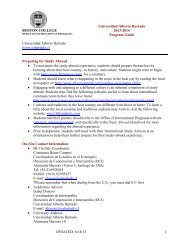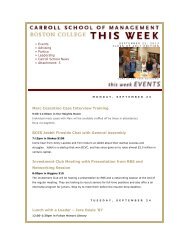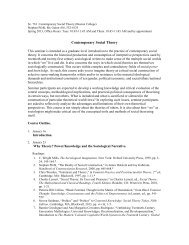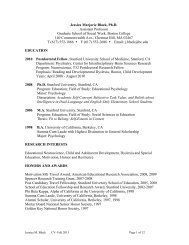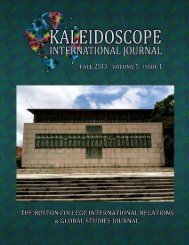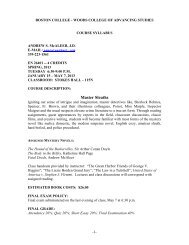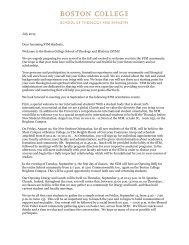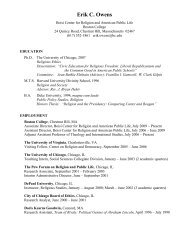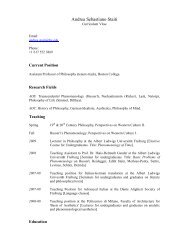separation of powers in thought and practice? - Boston College
separation of powers in thought and practice? - Boston College
separation of powers in thought and practice? - Boston College
You also want an ePaper? Increase the reach of your titles
YUMPU automatically turns print PDFs into web optimized ePapers that Google loves.
2013] Separation <strong>of</strong> Powers <strong>in</strong> Thought <strong>and</strong> Practice? 439<br />
pr<strong>in</strong>ciple <strong>of</strong> the legal constitution.21 The Bicameralism <strong>and</strong> Federalism<br />
Pr<strong>in</strong>ciples, by contrast, are evidently pr<strong>in</strong>ciples <strong>of</strong> the U.S. Constitution,<br />
<strong>and</strong> the Checks <strong>and</strong> Balances Pr<strong>in</strong>ciple is an umbrella term for a number<br />
<strong>of</strong> pr<strong>in</strong>ciples such as the presidential veto, the Senate’s “advise-<strong>and</strong>consent<br />
role” <strong>in</strong> a number <strong>of</strong> areas, <strong>and</strong> the pr<strong>in</strong>ciple <strong>of</strong> judicial review<br />
<strong>of</strong> legislation.22<br />
It is common, <strong>in</strong> essays <strong>of</strong> this k<strong>in</strong>d, to go on to excoriate judges<br />
<strong>and</strong> colleagues for “confus<strong>in</strong>g” these pr<strong>in</strong>ciples with one another, <strong>and</strong><br />
for us<strong>in</strong>g the language <strong>of</strong> <strong>separation</strong> <strong>of</strong> <strong>powers</strong> loosely <strong>and</strong> <strong>in</strong>accurately.23<br />
No doubt M.J.C. Vile is right to say that the <strong>separation</strong> <strong>of</strong> <strong>powers</strong><br />
“represents an area <strong>of</strong> political <strong>thought</strong> <strong>in</strong> which there has been an extraord<strong>in</strong>ary<br />
confusion <strong>in</strong> the def<strong>in</strong>ition <strong>and</strong> use <strong>of</strong> terms.”24 But it is<br />
futile for the analytic philosopher to go on pedantically <strong>in</strong> those tones.<br />
People use a phrase as they use it. All I want to say is that the <strong>separation</strong><br />
<strong>of</strong> executive, judicial, <strong>and</strong> legislative functions from one another has<br />
some importance <strong>in</strong> our constitutional theory even apart from—or<br />
over <strong>and</strong> above—the importance <strong>of</strong> observ<strong>in</strong>g any <strong>of</strong> the other pr<strong>in</strong>ciples<br />
I have mentioned. What matters to me is that we isolate <strong>and</strong> underst<strong>and</strong><br />
that importance. We can then choose to use the phrase “<strong>separation</strong><br />
<strong>of</strong> <strong>powers</strong>” as we like, maybe as though it represented a<br />
conglomeration <strong>of</strong> the considerations that perta<strong>in</strong> to the first three<br />
pr<strong>in</strong>ciples on my list, <strong>and</strong> maybe the last two as well. But at least we will<br />
now have some grasp on a particular set <strong>of</strong> considerations that really<br />
21 True, the Constitution does divide power <strong>in</strong> particular ways; but the Division <strong>of</strong><br />
Power Pr<strong>in</strong>ciple presents it as a wholesale matter <strong>and</strong> embodies a general theory about why<br />
this is important that the Constitution does not necessarily embrace.<br />
22 It is possible that we should say about some <strong>in</strong>stances <strong>of</strong> the Checks <strong>and</strong> Balances<br />
Pr<strong>in</strong>ciple what I said about the Division <strong>of</strong> Power Pr<strong>in</strong>ciple. To identify, say, the Senate’s<br />
role <strong>in</strong> ratify<strong>in</strong>g treaties as a matter <strong>of</strong> checks <strong>and</strong> balances is to subscribe to a particular<br />
theory about why the Senate was given that power, <strong>and</strong> that theory might or might not be<br />
correct. That might not be <strong>thought</strong> correct, for example, by one who believed—as James<br />
Madison asserts <strong>in</strong> Helvidius No. 1—that the Senate has this role simply because treatymak<strong>in</strong>g<br />
is a form <strong>of</strong> law-mak<strong>in</strong>g. See Madison, supra note 18, at 59.<br />
23 See, e.g., Vile, supra note 9, at 2 (“The doctr<strong>in</strong>e <strong>of</strong> <strong>separation</strong> <strong>of</strong> <strong>powers</strong> . . . [has] been<br />
comb<strong>in</strong>ed with other political ideas, the theory <strong>of</strong> mixed government, the idea <strong>of</strong> balance,<br />
the concept <strong>of</strong> checks <strong>and</strong> balances, to form the complex constitutional theories that provided<br />
the basis for an effective, stable political system.”); Edward L. Rub<strong>in</strong> & Malcolm Feeley,<br />
Federalism: Some Notes on a National Neurosis, 41 UCLA L. Rev. 903, 907–09 (1994) (stat<strong>in</strong>g that<br />
federalism, “once properly def<strong>in</strong>ed, does not secure citizen participation, does not make<br />
government more responsive or efficient by creat<strong>in</strong>g competition, <strong>and</strong> does not encourage<br />
experimentation,” <strong>and</strong> that the U.S. Supreme Court “can proclaim the virtues <strong>of</strong> federalism<br />
with a straight face only because it does not know what federalism is”).<br />
24 Vile, supra note 9, at 2.



